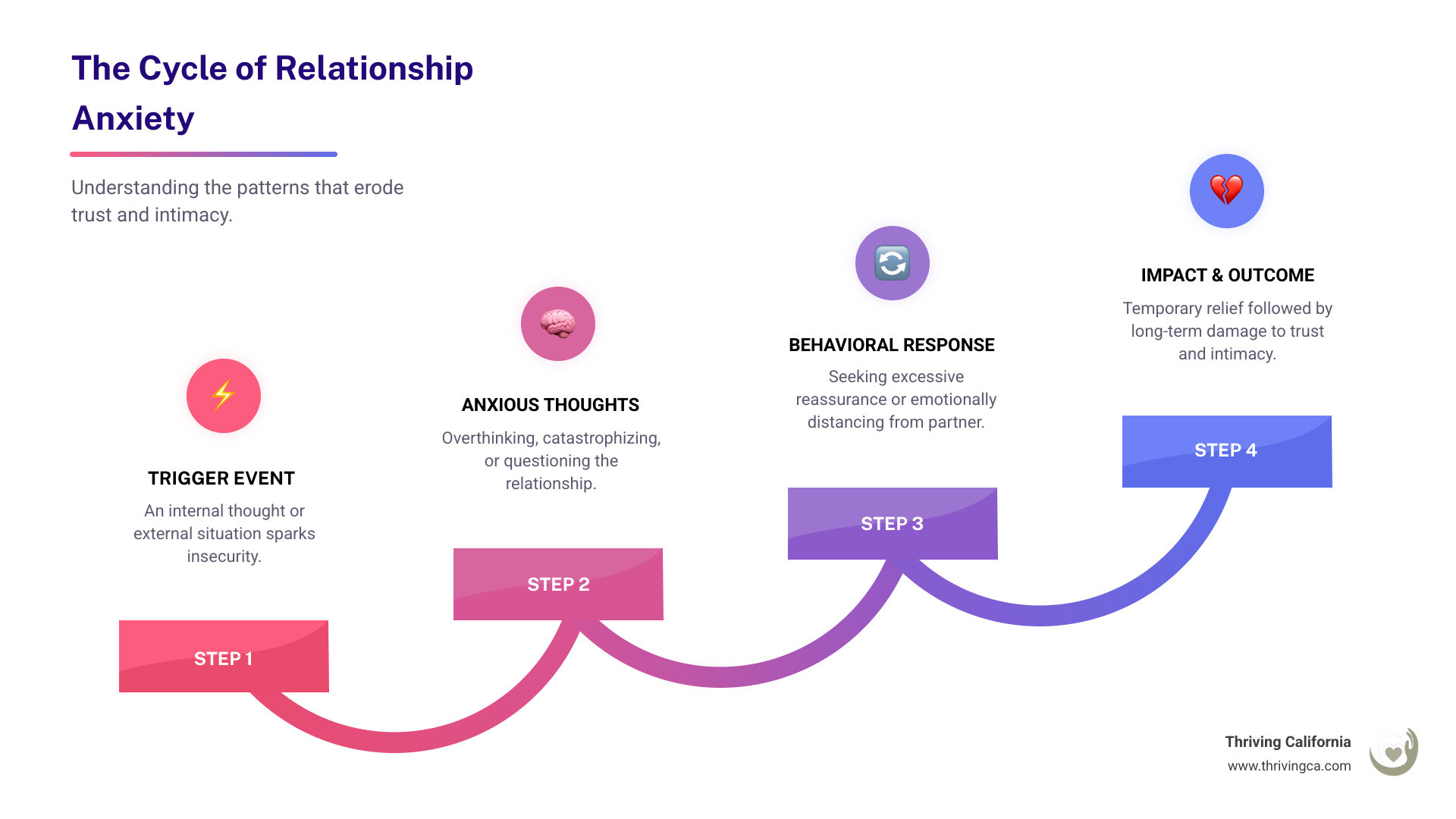Navigating Therapy for Relationship Anxiety as New Parents: Finding Your Way Back to Connection

Becoming a parent transforms everything—including your romantic relationships. You love your partner deeply, yet find yourself experiencing relationship anxiety through constant questioning of their commitment, needing reassurance, or feeling insecure about your bond. These persistent worry patterns and anxious feelings about your romantic connection can feel especially overwhelming during the intense early years of parenthood.
At Thriving California, our group practice of doctoral-level mental health professionals specializes in supporting parents with young children (ages 0-3) to overcome relationship anxiety and build healthy relationships. Serving families in Napa, Lafayette, Thousand Oaks, and throughout California via telehealth, we understand how new parenting issues can intensify relationship anxiety and create distance where you crave deeper emotional connection.
Understanding Relationship Anxiety in the Context of Parenthood
Relationship anxiety goes beyond typical relationship challenges. It's a persistent pattern of insecurity and fear about your romantic partner that affects your mental health and well-being. For new parents, the combination of sleep deprivation, hormonal shifts, identity changes, and increased responsibilities can amplify these anxious thoughts, making it difficult to feel secure in your present relationship.
Unlike generalized anxiety disorder, which involves broad worries across life areas, relationship anxiety specifically targets your romantic relationships. Mental health challenges during early parenthood can intensify these patterns, especially when past relationships or attachment wounds remain unhealed.
Recognizing Signs of Relationship Anxiety in Parents
When you're caring for a young child while experiencing relationship anxiety, certain common signs and patterns emerge that can affect both you and your partner's feelings:
Constant need for reassurance: You might engage in constant worrying, repeatedly asking if your partner still loves you or if they're happy. This persistent worry stems from deeper anxious attachment style patterns that parenthood can trigger.
Overthinking interactions: Anxious thoughts spiral from simple interactions—a delayed response or tired sigh becomes catastrophic. These negative thoughts about your partner's feelings can consume your present moment awareness.
Fear of abandonment: The vulnerability of depending on your romantic partner during this intense phase triggers separation anxiety. You might test their commitment through conflict or withdrawal, unable to manage relationship anxiety effectively.
Low self-esteem issues: "Am I still attractive?" "Am I good enough?" These self-esteem issues compound relationship anxiety, making it impossible to believe in your loving relationship.
Self-sabotaging behaviors: Creating conflict during peaceful moments or pushing away when you need professional support most—attempts to confirm fears that undermine your well-being.
Difficulty with vulnerability: Sharing true feelings about parenthood, your changing body, or relationship fears feels risky. Without healthy boundaries between protective walls and openness, emotional distance grows.
Physical Symptoms of Relationship Anxiety
Your body manifests relationship anxiety through physical symptoms and physical reactions that new parents might mistake for general stress. These physical signs include persistent stomach issues, tension headaches, disrupted sleep beyond baby-related wakings, appetite changes, and racing heartbeat. Understanding these physical symptoms helps recognize when to seek professional guidance for your mental health.

The Roots: How Past Experiences Influence Relationship Anxiety
Understanding why relationship anxiety affects new parents requires exploring deeper patterns. At Thriving California, our therapeutic approaches help parents understand how past experiences and attachment style patterns create current anxious feelings.
Attachment Styles and Their Impact on Romantic Relationships
Your attachment style profoundly influences intimate relationships—especially during parenthood's vulnerability. Our mental health therapists help you recognize these patterns:
Secure attachment style enables comfortable intimacy and trust. Individuals with secure attachment can ask for help and offer support while maintaining personal well-being.
Anxious attachment style creates intense abandonment fears, leading to persistent worry about your partner's feelings. Parenthood heightens these fears—"What if they leave?" becomes consuming.
Avoidant attachment causes discomfort with increased intimacy parenting requires. You might withdraw when your family needs connection most, struggling to feel secure together.
Disorganized attachment creates confusing dynamics where you simultaneously crave and fear closeness, making stable co-parenting challenging.
Through our relational therapy approach, we help overcome relationship anxiety by developing more secure attachment style patterns during this transformative time.
Birth Trauma and Relationship Dynamics
Birth trauma significantly impacts romantic relationships in unexpected ways. Past relationship traumas can resurface during birth experiences, affecting your ability to maintain healthy relationships. At Thriving California, we specialize in therapy for relationship anxiety stemming from birth trauma using somatic resourcing and bilateral stimulation. Traumatic birth experiences—whether medically complicated or emotionally overwhelming—can create:
- Disconnection from your body affecting intimate relationships
- Intrusive memories interfering with emotional connection
- Resentment impacting your partner's feelings and trust
- Fear of vulnerability after feeling exposed
- Difficulty trusting with emotional or physical needs
Our specialized approach helps process these experiences to alleviate symptoms, typically within 3-6 sessions for individuals or 6-12 sessions for couples, improving relationship satisfaction.
How Past Relationships Shape Present Patterns
Previous relationship wounds often resurface during early parenthood stress. Past experiences of betrayal, witnessing unstable partnerships, or lacking healthy relationship models create internal "alarm systems." These contributing factors from past relationships make it difficult to feel secure even in loving relationships.
Our psychodynamic approach helps differentiate between past relationship traumas and current reality, supporting your overall well-being.

Impact on Your Partnership and Well-Being
Untreated relationship anxiety creates ripple effects throughout your family. For parents of young children, these impacts affect your romantic partner, yourself, and your family's emotional climate.
Personal Toll of Experiencing Relationship Anxiety
Living with relationship anxiety while parenting depletes your mental health and personal well-being. Constant worrying creates:
- Emotional exhaustion preventing you from being present
- Mental fog interfering with bonding and daily functioning
- Inability to enjoy precious moments due to anxious thoughts
- Physical symptoms further depleting limited energy
- Reduced self-awareness about your needs and boundaries
These challenges make it essential to manage relationship anxiety through professional support.
Communication Breakdowns and Relationship Challenges
Anxiety distorts communication between partners. Simple statements get filtered through fear, with negative thoughts transforming neutral comments into criticism. These misinterpretations create defensive responses when you need teamwork most.
Our mental health professionals use effective coping strategies to help couples recognize patterns and develop compassionate communication, establishing healthy boundaries while maintaining emotional connection.
The Accommodation Trap
Well-meaning partners often try managing their loved one's anxious feelings by constantly providing reassurance. While seemingly helpful, this prevents growth. The anxious partner doesn't develop confidence to feel secure independently, while the accommodating partner becomes exhausted.
Through our therapeutic approaches, couples learn to support each other while maintaining healthy boundaries and personal well-being.
Pathways to Overcome Relationship Anxiety at Thriving California
Our group practice offers specialized therapy for relationship anxiety, understanding unique challenges of maintaining romantic relationships while caring for young children.
Individual Therapy for Parents
Our individual therapy sessions provide confidential space to explore relationship anxiety without judgment. Using psychodynamic and relational approaches, plus Internal Family Systems when appropriate, we help you:
Understand anxiety origins: Explore how early attachment style patterns and past experiences contribute to current fears affecting your mental health.
Process birth-related trauma: When birth experiences affect your ability to feel secure, we use specialized techniques including somatic resourcing and bilateral stimulation.
Develop self-compassion: Learn recognizing triggers with kindness, understanding that experiencing relationship anxiety often stems from self-protection.
Build emotional resilience: Develop internal resources to self-soothe without constant external validation, improving your well-being.
Strengthen sense of self: Rediscover identity beyond roles, creating stable foundation for healthy relationships.
Each therapy session lasts 50 minutes, with our doctoral-level clinicians tailoring approaches to help overcome relationship anxiety effectively.
Couples Therapy for New Parents
When relationship anxiety affects both partners, our couples therapy addresses dynamics together. Our Gottman-informed approach helps improve relationship satisfaction by:
Identifying negative cycles: Recognize patterns keeping you stuck in anxious thoughts and disconnection.
Sharing vulnerable emotions: Move beneath conflicts to express deeper fears about your partner's feelings safely.
Rebuilding connection: Learn turning toward each other during difficult moments, strengthening your loving relationship.
Creating secure co-parenting: Develop trust and teamwork while maintaining healthy boundaries.
For couples with birth trauma, our specialized approach helps both process experiences together, rebuilding intimate relationships and helping you feel secure.

Our Therapeutic Process
Beginning therapy for relationship anxiety at Thriving California starts with a free 20-minute consultation. We learn about specific relationship challenges and ensure proper fit. If not appropriate, we provide referrals.
Initial sessions focus on understanding you holistically—your history, parenthood transition, relationship dynamics, and therapy goals. Rather than rigid plans, we maintain flexibility while holding therapeutic goals, allowing natural evolution as needs change.
For birth trauma work, we follow structured approaches beginning with conception/pregnancy, moving through birth, addressing postpartum impacts. Most clients seeking professional guidance find significant relief within typical timeframes, experiencing improved relationship satisfaction.
Practical Strategies to Manage Relationship Anxiety
While professional support provides healing foundation, daily practices support progress in overcoming relationship anxiety:
Self-Care for Anxious Parents
- Mindfulness practices: Simple breathing returns you to present moment during feeding or naps
- Body awareness: Notice physical reactions and practice gentle release
- Journaling: Process persistent worry on paper rather than mental loops
- Maintain connections: Preserve friendships and interests supporting personal well-being
- Establish healthy boundaries: Know your limits while caring for others
Supporting Your Romantic Partner
When your partner shows signs of relationship anxiety:
- Listen without immediately fixing or reassuring
- Validate anxious feelings without reinforcing fears
- Maintain your own healthy boundaries and self-care
- Encourage seeking professional guidance when patterns persist
- Respect both your needs for well-being
Remember healing happens gradually while managing early parenthood demands.
Building Healthy Relationships Through Professional Support
Establishing healthy relationships requires addressing underlying anxious attachment style patterns and past experiences. Our mental health therapists help you develop effective coping strategies for managing anxious thoughts while building secure attachment style foundations.
Through therapy for relationship anxiety, you'll learn recognizing usual behaviors versus anxiety-driven reactions, helping both you and your partner feel secure. This process involves understanding how past relationships and experiences influence current patterns, developing self-awareness about triggers, and creating healthy boundaries that support intimate relationships.
Finding Your Way Forward
Relationship anxiety during early parenthood affects countless couples. Sleep deprivation, identity shifts, hormonal changes, and increased vulnerability can trigger or intensify these patterns. However, with proper mental health support, you can overcome relationship anxiety while navigating this transformative time.
At Thriving California, our group practice specializes in helping parents with young children build secure, loving relationships. Our doctoral-level mental health professionals understand the unique intersection of new parenthood, relationship anxiety, pregnancy concerns, and birth trauma. Using psychodynamic, relational, and specialized trauma therapeutic approaches, we help heal past wounds and create the connected partnership supporting your overall well-being.
Whether you're in Napa, Lafayette, Thousand Oaks, or anywhere in California through telehealth services, professional support is available. You don't have to navigate relationship anxiety alone while caring for your young child.
Taking the First Step Toward Healthy Relationships
Recognizing you need support to manage relationship anxiety takes courage, especially when overwhelmed with parenting. Consider seeking professional guidance if:
- Persistent worry and anxious thoughts consume daily life
- Physical symptoms affect your ability to parent effectively
- You recognize patterns from past relationships affecting your present relationship
- Your partner expresses concern about signs of relationship anxiety
- You want breaking cycles before they affect your child's well-being
- Relationship challenges feel overwhelming despite self-help attempts
Our intake process supports parents experiencing relationship anxiety. Through free consultation, we ensure proper fit for your needs. Understanding precious time constraints, we make therapy for relationship anxiety accessible and effective.
Your romantic relationships deserve the same care given your child. Healing from relationship anxiety is possible—you don't have to overcome relationship anxiety alone. Contact Thriving California today to learn how our specialized therapy services support your journey toward secure, connected partnership during these precious but challenging early parenting years. Together, we'll help you build the healthy relationship foundation your family deserves.

